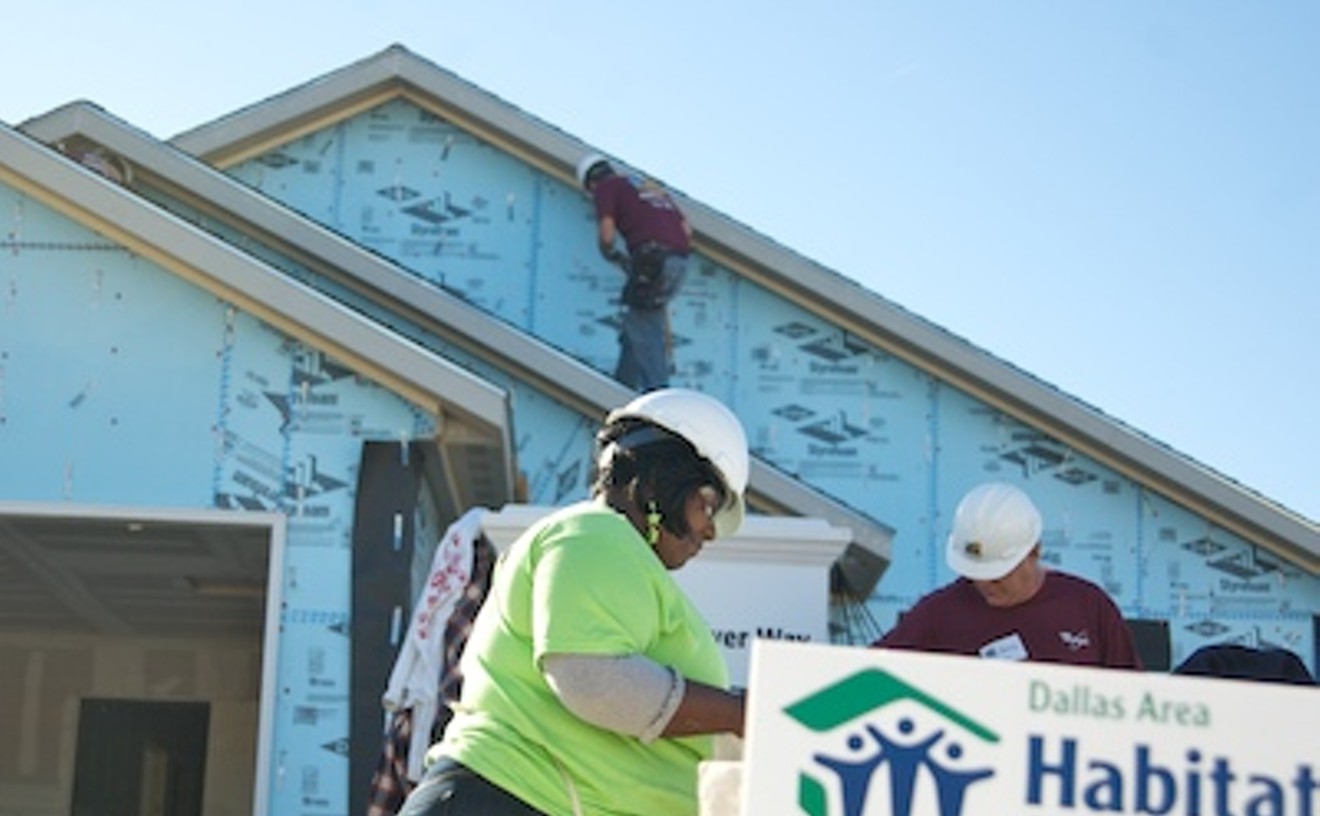Only in Dallas. This always was a town where people knew how to avoid talking about the obvious. And Dallas is, after all, where the recent cycle of American Catholic priest sex scandals began five years ago with the history-making jury awards in the Rudy Kos civil case.
Kos, a Catholic priest accused of having sex with dozens of altar boys, was convicted in a criminal trial a year after the civil trial and is now serving a sentence of life in prison.
I guess this is where I am expected to make the politically correct stipulation that homosexuality has no relationship with pedophilia, and, based on everything I have read, that's true. It's all about "power."
But can we say sexual power?
And if we call it that, then how can we talk about sexual abuse by a priest, or by any other person for that matter, and not talk about the obvious in-your-face issues concerning that person's sexuality?
I covered some of the Kos civil trial as a reporter for the Houston Chronicle, and I remember what everybody was whispering about in the corridors. One hot topic, which did get reported eventually in an article in D Magazine, was the cadre of militantly gay priests who had achieved influence in this area's Holy Trinity Seminary. Parents told me how their sons came back from seminary complaining about the verbal hammerings they endured for being straight.
Another issue at the time of the Kos trial was a priest who had come to Dallas to take a high diocesan office supposedly on the condition that the diocese find employment for his male life partner, also a priest. The diocese denied that any such arrangement existed when I checked on the story at the time. But Dallas civil rights lawyer Mike Daniel, a Catholic, remembered that imbroglio right away when I called him during the recent bishops' convention. He said he thought the difficult issue for Catholics in that case was less homosexuality than celibacy.
"I guess the objection would have been the same if it had been a woman," he said. "It's not celibacy, whether it's male or female."
I asked if the two scenarios were truly equivalent--un-celibate behavior with a woman vs. un-celibate behavior with another man. He pondered a little and said the practical reality seems to be that they are not.
"The point is, would the hierarchy have allowed [two diocesan officials] who were male and female to live together? It probably wouldn't have. Whereas I think it was fairly widely accepted that they were special partners. It was not anything they were particularly shy about showing, either."
So. The Catholic Church preaches that homosexuality is a sin. Only men can be Catholic priests. They must vow celibacy. And yet the one form of non-celibacy that seems to be winked at by both the hierarchy and the faithful is homosexuality. Quite apart from political correctness, can somebody just help me with the math?
And let me declare myself a little here. I was raised in the Protestant Episcopal Church, the son of a clergyman. My father would have been called a priest in the Dallas diocese but was a minister in Eastern Michigan. Every Sunday Episcopalians swear fealty to the "Holy catholic" church. It's a hard outfit to figure sometimes. A wag once told me the Episcopal Church is the Catholic Church without the religion. It's easy to make jokes.
But I do have nagging doubts about Protestantism, having grown up over the store. I know that my own household has just been through a very dispiriting experience in the United Methodist Church in which I was reminded, once again, that the great power on earth, other than the Word, is money. Every time I hear someone complain about the arrogance of the Catholic clergy, I think, yeah, but if you don't stay pretty arrogant with these Christians, the rich ones will whip their checkbooks out of their holsters and start firing financial bullets at the preacher's feet to make him dance.
An aura of intimidating power is not in and of itself evil. It's what you do with your intimidating power. MTV has power. The church needs power, too.
But if you take power and tie too many moral knots in it, with deception, hypocrisy and self-protection, then inevitably that power becomes a flail. Somewhere in the twists and turns the powerful person manages to objectify and dehumanize the people on whom he must exercise power. Objectification is always the first major step on the road to the gas chambers, or to child sexual abuse.
But who is the hypocrite and who the moral knot-maker? Is it the homosexual priest who devotes his life to God and church while acknowledging his own nature as a homosexual? Or does the church tie the knot by expecting priests to enforce sexual order on the faithful while the church refuses to honestly address the sexuality of the priests themselves?
I apply about a 60 percent discount to my own views here, by the way, because I know that I am an outsider looking in, and there's a lot I won't really get because of it. I also worry, in passing judgment on someone else's religious faith, that I will just wind up sounding like the recent doofus at the Baptist convention who said something to the effect that the Baptists are leading the Muslims by two touchdowns and a field goal in the closing minutes of the last quarter of the game of life.
Therefore, I must check myself against smart Catholics. Wick Allison, publisher of D Magazine in Dallas and former publisher of the National Review, may be Dallas' most devout thoughtful Catholic who can write. In a phone conversation just after the bishops' conference, he said the issue of homosexuality among priests in the Dallas diocese must be drawn even more narrowly to the question of priests who somehow manage to be both flamboyantly gay and also secretive at the same time. He said it was clear five years ago that the Dallas-area seminary had spawned "an environment of openly hostile flamboyant gays.
"In Key West, where we used to have a house, there is a distinction between homosexuals and gays. They'll tell you that 'we threw out the gays 15 years ago.' Of course, who's telling you this is a homosexual couple that you're having dinner with."
The issue here, he said, has involved the latter type, the priests who would be called gay even in Key West. Among some of them, Allison sees evidence of a very complicated, not to say twisted, culture of sexual subterfuge.
"Yeah, there is a subculture," he said, "and it can be painful, and it can be self-destructive and destructive to others, just like any secret subculture."
I thought it was interesting that both he and Mike Daniel came to the same bottom line--that everyone would be better off if homosexual priests were allowed to come all the way out of the closet, at least in terms of publicly declaring their status, if not in violating their oath of celibacy.
"If I were writing about this," Allison said, "I might write that it might be a bit better for the church if everyone came out of the closet. I don't think the parishioners care. I don't know who does care. It's the secrecy that allows something to fester and to become really sick. I don't know if it has anything to do with pedophilia, but it [the homosexuality of priests] is one of the things that certainly has been denied by the hierarchy. And I think they think it's tied to the pedophilia."
How much more tangled can we make this web? The church wrongly ties pedophilia to homosexuality but also wrongly denies that many of its priests are homosexual? What a fine mess.
But it's precisely this mess that makes official cover-up and complicity in child sex abuse possible, according to Windle Turley, a lawyer who represented several of Rudy Kos' victims five years ago. And I know you're going to say, "He's a lawyer who's in this for the money." But I called him after the conference because I remembered, money or not, that he and his people did major research into the history of sexual abuse in the Catholic Church for the Kos case.
He doesn't blame pedophilia on homosexual clergy, by any means, but he does think the church's confusion and official hypocrisy on the issue of the sexuality of priests help create a dangerous atmosphere.
"I'm not saying that gays caused the pedophile abuse," Turley told me. "I'm saying there is a tolerance of the failure of celibacy."
The underground nature of un-celibate behavior, both homosexual and heterosexual, he said, has made possible a brand of adult dishonesty and manipulativeness in which pedophiles may find convenient shelter.
The sum of these problems, Turley believes, makes the Catholic Church tangibly more dangerous to children than other religious institutions. He says the Catholic Church suffers from a "long heritage and practice of hiding and concealing and tolerating sexual abuse." As a result, he says, "I think that pedophilia is more common in the Catholic Church than it is in other religious institutions."
Daniel told me that Catholic parishioners and parents find some aspects of the situation simply too bizarre and embarrassing to deal with. He said--and I confirmed with an attorney for the diocese--that one of the new rules adopted after the Kos case provides explicitly that it is not permissible for a minor to spend the night in the rectory and sleep in the priest's bed.
Good rule. On the one hand.
On the other hand, if you need a rule like this, don't you think you might need to talk about a whole bunch of other things as well?











